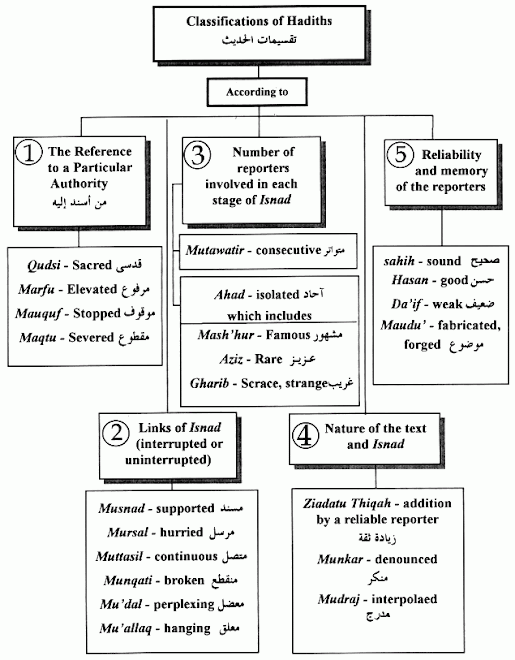
Abu Ja'far Muhammad bin Ya'qub bin Ishaq al-Kulayni al-Razi (864-941 C.E.) was a ninth/tenth century Twelver Shi'i religious scholar and
muhaddith, a scholar and specialist in
hadith (plural:
ahadith), reports of the Prophet Muhammad's sayings and actions as recorded by transmitters from Companions of the Prophet. For Twelver Shi'is,
ahadith may also be sayings and actions of the 14 "Infallibles," individuals whom they believe to be inerrant. These 14 include the 12 Imams, descendants of the Prophet through his cousin and son-in-law, 'Ali bin Abi Talib, and, more specifically, 'Ali's son Husayn, the third Imam.
Al-Kulayni, as he is usually known, compiled one of the four collections of
ahadith (
al-kutub al-arb'ah) considered canonical by Twelver Shi'is,
Kitab al-Kafi ("Sufficient Book"). The two
hadith below come from the one part of the collection,
Furu' al-Kafi (approximately, "Sufficient Branches"). Both address the issue of
jihad ("struggle"), which has numerous varieties in Sunni and Shi'i jurisprudence, including the now well-known military
jihads, offensive and defensive. Honorific formulas repeated after the name of scholars, Infallibles, and the Prophet are omitted.
_______________________________
Hadith #3638, Book of Social Manners, Chapter 10, Hadith #1'Ali ibn Ibrahim narrated from his father Hammad ibn 'Isa from Rib'i ibn 'Abdullah from Abu 'Abdullah (sixth Imam, Ja'far al-Sadiq), who said: "The Messenger of God would offer greetings of peace to women and they would respond to him. The commander of the faithful (
Amir al-Mu'mineen; first Imam, 'Ali ibn Abi Talib) would offer greetings of peace to women but he disliked offering it to young women. He would say: 'I fear their voice may attract me and a feeling may cause me more harm than the reward for offering the greeting of
as salaamu 'alaykum.'"
Hadith #3640, Book of Social Manners, Chapter 11, Hadith #2Muhammad ibn Yahya narrated from Ahmad ibn Muhammad ibn 'Isa from Muhammad ibn Yahya from Ghiyath ibn Ibrahim from Abu 'Abdullah (sixth Imam, Ja'far al-Sadiq), who said: "The commander of the faithful (first Imam, 'Ali ibn Abi Talib) has said, 'Do not initiate the offering of
as salaamu 'alaykum to the People of the Book (Christians, Jews, Sabians), but if they offer it, just reply, '
wa 'alaykum' ("the same unto you")."
Hadith #3639, Book of Social Manners, Chapter 11, Hadith #1'Ali ibn Ibrahim narrated from his father Ibn Abu 'Umayr from Ibn 'Udhaynah from Zurara from Abu Ja'far (fifth Imam, Muhammad al-Baqir) who said: "Once, a Jew [a Jewish person,
yahudi) went into the presence of the Messenger of God while [his wife] 'A'isha* was with him. The Jew said, "
Sam 'alaykum" (wrath, condemnation upon you) instead of "
As salaamu 'alaykum" (upon you be peace). The Messenger of God replied, "'
Alaykum" ("the same unto you"). Then another Jew came and said the same thing as the one before and the Messenger of God responded in the same manner as he had before. Then a third Jew came. He also said the same thing that the other two had said before and the Messenger of God responded just as he did the previous two times.
'A'isha became angry and said: "
'Alaykum al-Sam (wrath, condemnation upon you), O' group of Jews, brethren of monkeys and swine.' The Messenger of God said to her, "O' 'A'isha, if hurling insults were to appear with a shape and form, it would have a very evil shape. Wherever gentleness is placed it beautifies this place and removing gentleness is only to make it a despised place."
'A'isha then asked, "O' Messenger of God, did you not hear their words, '
al-Sam 'alaykum'?" The Messenger of God said, "I heard them, but did you not note how I have replied to them? I said: '
'Alaykum" (and unto you). Whenever a Muslim offers you the greeting of peace, say: '
As salaamu 'alaykum,' but when a non-Muslim says something to you in their way, just say '
'Alayka' (and unto you).'
 One of Al-Sahab's newest introductory segment for its videos, featuring its name with moving, moon-lit clouds and gold bullets emblazoned with its name.
One of Al-Sahab's newest introductory segment for its videos, featuring its name with moving, moon-lit clouds and gold bullets emblazoned with its name.












